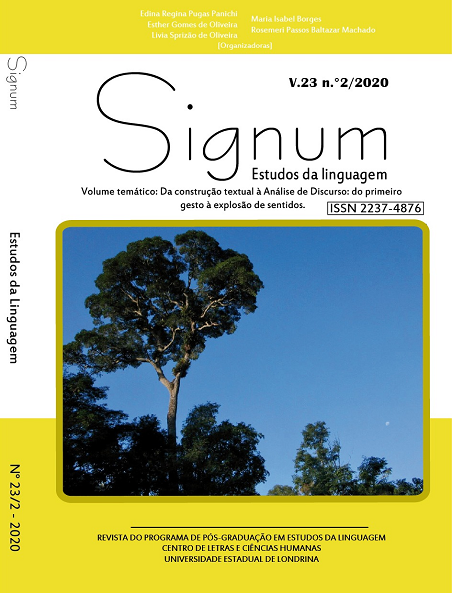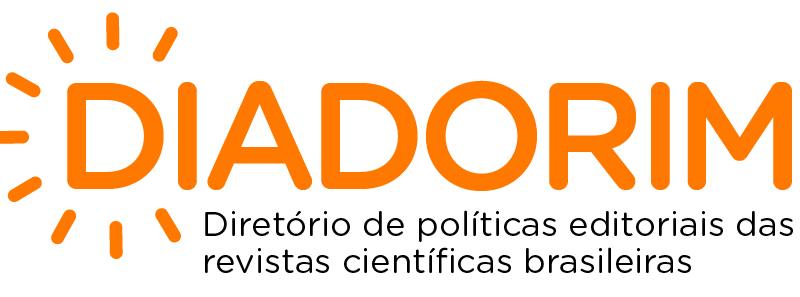Estrutura e Sentimento: relações retóricas em comentários opinativos no Facebook
DOI:
https://doi.org/10.5433/2237-4876.2020v23n2p100Palavras-chave:
Análise de sentimentos, Rhetorical Structure Theory, Facebook.Resumo
O uso das redes sociais vem crescendo vertiginosamente nos últimos anos. O Facebook, por exemplo, registrou mundialmente uma média de 1,47 bilhões de usuários ativos ao dia e de 2,23 bilhões ao mês em junho de 2018. Diante da enorme quantidade de usuários conectados às redes sociais, surgiu, por parte dos departamentos de marketing de grandes corporações e de analistas políticos, o interesse por minerar as opiniões dos usuários das redes a respeito de produtos, serviços, temas debatidos na sociedade, imagem de personalidades etc. Na análise de sentimentos, a descrição dos meios gramaticais e lexicais de expressão da subjetividade é utilizada para a criação de aplicações que realizem a análise automaticamente, permitindo, por exemplo, a prever tendências financeiras, intenções de voto, identificar a avaliação de produtos disponíveis online, como livros, filmes etc. Tomando como base a Rhetorical Structure Theory (RST), teoria descritiva que investiga a organização dos textos caracterizando as relações que se estabelecem entre as partes do texto, este trabalho tem como objetivo descrever as relações que emergem de comentários avaliativos em páginas públicas de empresas no Facebook.
Downloads
Referências
ANTONIO, J. D. Expression of cause, evidence, justify and motivation rhetorical relations by causal hypotactic clauses in Brazilian Portuguese. Acta Scientiarum, Language and Culture, v.
34, n. 2, p. 253-268, jul./dez. 2012.
ANTONIO, J. D.; SANTOS, J. A. A estrutura retórica do gênero resposta argumentativa. Signum: Estudos da Linguagem, Londrina, v. 17, n. 2, p. 193-223, 2014. Disponível em: https://bit.ly/3qy50wS.
CARLSON, L.; MARCU, D. Discourse Tagging Reference Manual. Los Angeles, CA: University of Southern California, 2001.
DE HAAN, F. The relation between modality and evidentiality. Linguistische Berichte, v. 9, p. 201-216, 2001.
FACEBOOK. Informações da empresa. Disponível em: http://bit.ly/3qEsBfn. Acesso em: 08 out. 2018.
HALLIDAY, M. A. K. An introduction to Functional Grammar. Baltimore: Edward Arnold, 1985.
HENGEVELD, K. Adverbial clauses in the languages of Europe. In: AWERA, J. (org.). Adverbial constructions in the languages of Europe. Berlin: Mouton de Gruyter, 1998. p. 335-419.
HENGEVELD, K.; MACKENZIE, J. L. Functional Discourse Grammar. A typologically-based theory of language structure. Oxford: Oxford University Press, 2008.
HOGENBOOM, A.; FRANSINCAR, F.; DE JONG, F.; KAYMAK, U. Using rhetorical structure in sentiment analysis. Communications of the ACM, v. 58, n. 7, p. 69-77, Jul. 2015.
IRUSKIETA, M.; DE ILARRAZA, A. D.; LABAKA, G.; LERSUNDI, M. The Detection of Central Units in Basque scientific abstracts. In: CONGRESO DE LA SOCIEDAD ESPAÑOLA DEL PROCESAMIENTO DEL LENGUAJE NATURAL, 31., 2015, Alicante. Actas... Alicante, ES: SEPLN, 2015.
LYONS, J. Semantics. Cambridge: Cambridge University Press, 1977.
MANN, W. C.; THOMPSON, S. A. Rhetorical Structure Theory: toward a functional theory of text organization. Text, v. 8, n. 3, p. 243-281, 1988.
MATTHIESSEN, C. Remembering Bill Mann. Computational Linguistics, v. 31, n. 2, p. 161- 172, 2005.
O'DONNELL, M. From corpus to codings: Semi-automating the acquisition of linguistic features. Proceedings of the AAAI Spring Symposium on Empirical Methods in Discourse Interpretation and Generation. Anais... Stanford: AAAI, 1995. p. 27-29.
PALMER, F. R. Mood and modality. Cambridge: Cambridge University Press, 1986.
SANTOS, K. R. Uma investigação funcionalista das relações retóricas do campo da avaliação no português falado. 2018. Dissertação (Mestrado em Letras) - Universidade Estadual de Maringá, Maringá, 2018.
SEIDMAN, G. Expressing the "true Self" on Facebook. Computers in Human Behavior, v. 31, n. 1, p. 367-372, 2014.
TABOADA, M. Implicit and explicit coherence relations. In: RENKEMA, J. (ed.). Discourse, of course. Amsterdam: John Benjamins, 2009. p. 127-140.
TABOADA, M. Sentiment analysis: An overview from Linguistics. Annual Review of Linguistics, v. 2, n. 1, p. 325-347, 2016.
TABOADA, M.; HABEL, C. Rhetorical relations in multimodal documents. Discourse Studies, v. 15, n. 1, p. 65-89, 2013.
THOMPSON, S. A.; MANN, W. C. A Discourse view of concession in written English. In: DELANCEY, S. C.; TOMLIN, R. S. (org.). ANNUAL PACIFIC LINGUISTICS CONFERENCE, 2., 1985. Proceedings… Eugene, OR: Department of Linguistics/University
of Oregon, 1985. p. 435-447.
TRAUGOTT, E. C. Subjectification, Intersubjectification and grammaticalization. In: DAVIDSE, K.; VANDELANOTTE, L.; CUYCKENS, H. (org.). (Inter)subjectivity and (inter)subjectification: a reassessment. Berlin: de Gruyter, 2010. p. 29-74.
TRNAVAC, R.; TABOADA, M. Discourse structure and attitudinal valence of opinion words in sentiment extraction. Linguistic Society of America Annual Meeting Extended Abstracts. Proceedings... Minneapolis, MN: Linguistic Society of America, 2014. p. 1-5.
WILSON, R. E.; GOSLING, S. D.; GRAHAM, L. T. A review of Facebook Research in the Social Sciences. Perspectives on Psychological Science, v. 7, n. 3, p. 203-220, 2012.
ZELDES, A. rstWeb - A browser-based annotation interface for rhetorical structure theory and discourse relations. In: NAACL-HLT 2016 SYSTEM DEMONSTRATIONS, San Diego. Proceedings… San Diego, CA: NAACL, 2016. p. 1-5.
Downloads
Publicado
Como Citar
Edição
Seção
Licença
Copyright (c) 2020 Signum: Estudos da Linguagem

Este trabalho está licenciado sob uma licença Creative Commons Attribution-NonCommercial-NoDerivatives 4.0 International License.
Signum: Estudos da linguagem, publica seus artigos licenciados sob a Licença Atribuição-NãoComercial-CompartilhaIgual 4.0 Internacional. Esta licença permite que terceiros façam download e compartilhem os trabalhos em qualquer meio ou formato, desde que atribuam o devido crédito de autoria, mas sem que possam alterá-los de nenhuma forma ou utilizá-los para fins comerciais. Se você remixar, transformar ou desenvolver o material, não poderá distribuir o material modificado.

















